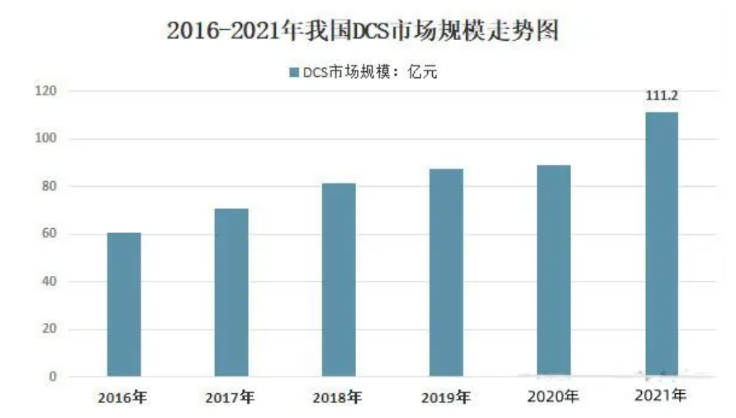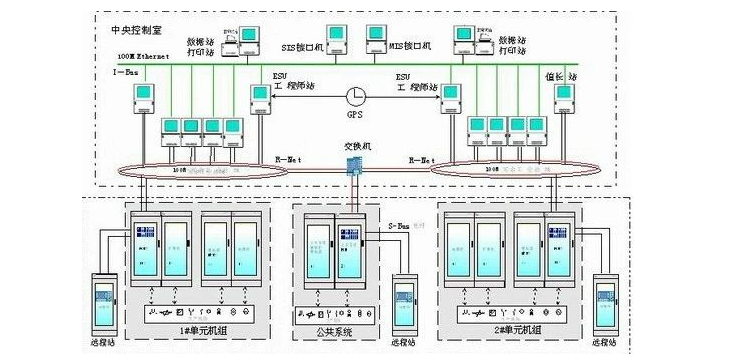In recent years, with the continuous growth of domestic DCS manufacturers and the continuous improvement of technology, DCS applications are gradually popularized.
In 2021, China's DCS market size reached 11.12 billion yuan, an increase of 24.6%. This data shows that the DCS market demand has shown a blowout growth trend, DCS has become an important application technology in the field of industrial control.

With the continuous upgrading of the application market and the promotion of national policies and regulations, DCS products are expected to further popularize and develop in the direction of large, high-end, joint control and focus on follow-up maintenance. At present, China's DCS product technology level relative to foreign countries there is still a big gap, but some domestic DCS manufacturers in the technical aspects of continuous research and development and innovation has made a great show. With the continuous development and upgrading of China's manufacturing industry, DCS products in the future market demand and development prospects will be more and more broad.

The advantage of DCS system is that it can realize the comprehensive control and monitoring of the production process, and improve the reliability and efficiency of production.
Strengthen data access and realize ubiquitous connection
In the rapid development of the Internet of Things and 5G technology, the scale of industrial perceived data has exploded, mainly due to the rapid development of advanced detection technology and sensor technology.
A large amount of data contains equipment and system characteristics of industrial sites. How to reliably access all kinds of iot sensing data to intelligent DCS, and seamlessly integrate data from various third-party systems such as PLC, to realize ubiquitous perception of generalized industrial process information and form the data basis for subsequent processes has become the basic capability requirement of intelligent DCS.
Strengthen analytical reasoning, mining data value
Industrial production data contains a lot of information, intelligent DCS real-time analysis of a large number of data, quickly extract the information and knowledge of the production process, requires its own depth of data analysis and information visualization capabilities.
The categories of data analysis computation in industrial processes include control computation, statistical computation, modeling computation, and knowledge computation (knowledge representation and inference). Intelligent DCS should be convenient and reliable to support the above calculation types, and realize the efficient integration design with human-machine interface and database system.
Strengthen the process control and realize the optimal decision
Intelligent DCS should be able to link with the underlying equipment and subsystems, use advanced control and intelligent control technology to achieve accurate and stable control of the process (rather than just PID), or be able to provide reliable intelligent and visual guidance and suggestions for decision makers, guide the production process to optimize, improve production efficiency and promote production safety.
Strengthen information security and realize coordinated control
In the context of the development of industrial Internet and 5G technology, intelligent DCS will further strengthen the integrated monitoring capability of the whole plant and form a unified intelligent "factory node".
On the other hand, the individual "factory nodes" will further network, interact, or cluster coordinated control. This requires intelligent DCS to have wide area networking capabilities, stable data links and interactions across physical areas and across network categories.
At present, chemical, electric power, petroleum and other fields are the main application areas of DCS in China. Relevant data show that in 2021, the scale of DCS in the chemical industry is 4.41 billion yuan, accounting for 37.24%; The scale of the electric power sector is 2.628 billion yuan, accounting for 23.63%; The scale of the oil field was 2.156 billion yuan, accounting for 19.43%.
With the country's increasingly high requirements for environmental protection, safety and other aspects, DCS technology will be more widely used in these fields.
In addition, with the popularization and application of the industrial Internet, the DCS system will be combined with other information technologies to form a more intelligent factory control system to achieve comprehensive production process control and management.
It is expected that in the future development, DCS technology will be applied in more fields, bringing more innovation and possibilities to the development of industrial automation and information technology.
At present, China's DCS market in the local brands to control technology, Hollysys mainly, foreign brands are mainly European and American Emerson, ABB, Siemens, Honeywell and Japanese brand Yokogawa Electric, the power field is mainly Emerson, Hollysys, ABB, Siemens; In the field of chemical industry, the company mainly focuses on central control technology, Hollysys, Yokogawa Electric and Honeywell. The petrochemical field is mainly dominated by central control technology, Emerson, Honeywell and Yokogawa Electric.
In recent years, under the influence of factors such as technology, national policy support and strategic choices, the market share of local brands has been continuously improved, increasing from 46.35% in 2016 to 55.72% in 2021.
In view of the development trend of the industry in the past two years, the industry concentration in the DCS field has been further strengthened, the head effect has been highlighted, and the industry pattern will gradually move from "group domination" to "three pillars".
From the perspective of regional aggregation effect. Chinese DCS enterprises are mostly concentrated in Beijing (23.5%), followed by Shanghai (14.7%) and Zhejiang (14.7%, mainly Hangzhou); The three cities of Beijing, Shanghai and Hangzhou are rich in university resources and abundant in automation talents, such as central control technology relying on the automation department of Zhejiang University, and then differentiated into a number of DCS enterprises, and economic activity is also the factor of DCS enterprise distribution concentration.